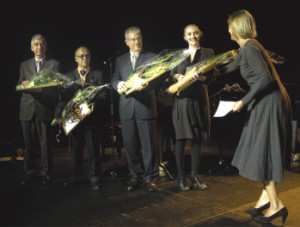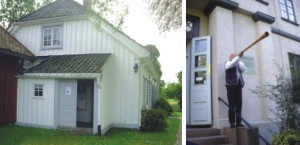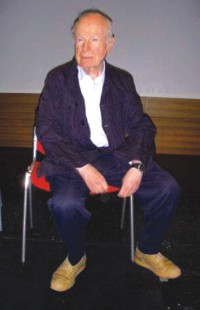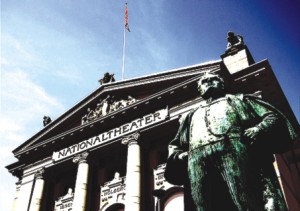|
Reflections
On the Centre Stage in a Distant Land
Abdul Mannan
 |
| The four receipients of National Ibsen Award with Norwegian actress Juni Dhar. |
The immigration formalities at the Oslo airport was the fastest I had ever experienced, taking about one minute. There were no forms to be filled in and no questions asked. The immigration officer, a smart lady in her early thirties, smiled at me, swiped my passport and wished me a happy stay in Norway. The official Ibsen Award party headed by Inger Buresund and her team along with Elizabeth Daae, wife of the Honorary Consul General of Bangladesh in Norway, were standing outside the arrival lounge with a Bangladeshi flag and our name tags to welcome us. Bangladesh is represented in Norway by Peter Daae, a very successful entrepreneur of Norway in the absence of a full time Bangladeshi Ambassador. Mrs. Daee drove us to Thon Hotel Slottparken, where we would be staying. The hotel was very conveniently located near the city centre and the National Theatre where most of the events would be held and the Ibsen plays staged. Oslo is one of the most expensive cities in the world and any ride in a taxi cab or other public transport would be a daunting prospect. On an average, Norway itself is a very expensive country with a high living cost. It has a population of only 4.6 million (0.35% population growth rate) with a per capita GDP of $53,000/-.
After a briefing by Inger on the afternoon of August 29 about the next few days' proceedings, our official function began with a welcome of playing the traditional flute at the Centre for Ibsen Studies. Stepping at the Centre it was apparent that Bangladesh was a popular name not only in Norway but in the Centre for Ibsen Studies. Bangladesh is known across Norway because of our Nobel Laureate Dr. Yunus. Besides him, Kamaluddin Nilu, currently working as a research scholar in the Center has made the art and culture of Bangladesh known to the art lovers of the university and Oslo itself. Functioning under the University of Oslo, Centre for Ibsen Studies is a research and documentation centre and has the world's largest collection of books and other material related to the works of Henrik Ibsen.
Apart from participants from Bangladesh there were participants from India, USA, Pakistan, Vietnam, Sweden, Great Britain, South Africa, Denmark and the host country Norway. A total of about one hundred and fifty participants from all these countries participated in this five day conference. The reception at the Ibsen Centre began with reading from the works of Ibsen and playing of traditional Norwegian musical instruments. Beginning on day one drinks were free flowing and food was in abundance. The indulgence enjoyed by the participants reached a new height when they got to watch Ibsen plays at the National Theatre on all four days, excepting the day we spent at Skien. Watching theatre at the National Theatre is expensive (a standard ticket costs about $60) and if you did not book your seat in advance you could be disappointed. Besides performers from Norway there were groups from Sweden, Hungary and Iran. As the performances were not in English there were simultaneous English subtitles. However watching the performance and simultaneously trying to read the sub title may not be the easiest thing to do.
 |
Henrik Ibsen Museum. And a traditional Norwegian welcome. |
Nothing could be more rewarding than being on the centre stage in a land, as distant as Oslo and Skien of Norway. I was to receive an International Award on behalf of the Center for Asian Theatre Bangladesh (CAT) along with three other organisations from USA, Norway and Afghanistan. Named Ibsen Awards after the great nineteenth century Norwegian playwright Henrik Ibsen, the International Ibsen Awards was established by the Norwegian government in 2007 to be awarded for the first time in 2008. The Committee for the International Ibsen Award is headed by the internationally renowned actress, director and author Liv Ullmann (USA and Norway). Besides selecting an internationally renowned theatre personality to receive the International Ibsen Prize the Committee is also mandated by the Government of Norway to select theatre organisations or persons that work in the spirit of Ibsen from around the world to receive an award which includes a monetary scholarship. The recipients do not necessarily have to work on plays or writings by Ibsen nor do they have to refer directly to Ibsen's colon. Besides the International Ibsen Awards, Sir Peter Brooks, the Internationally acclaimed British theatre and film director ( A Sentimental Journey, The Lady from the Sea, Love's Labour's Lost in Stratford-upon-Avon, Mahabarata) was selected to receive the 2008 International Ibsen Award. This award would be handed over in the National Theatre of Oslo while the other awards would be presented at Skien, Telemark, a small city about ninety miles from Oslo, the birth place of Henrik Ibsen. This event would be managed by the Skien Municipality, steered by a Committee headed by Inger Buresund, Director Ibsen Awards.
 |
Sir Peter Brooks, winner of the 2008 International Ibsen Award. |
Besides me, the team from Bangladesh included Jamil Osman, Secretary, Ministry of Information and Chairman of the Bangladesh Censor Board, GOB, who presented a paper on the myths and realities of censorship of local and foreign films in Bangladesh. Professor Shafi Ahmed of the Department of English, Jahangirnagar University was included in the team as a teacher and researcher of theatre who would later on give a lecture at the Centre for Ibsen Studies, University of Oslo.
The great event of the conference was honouring Sir Peter Brooks, the recipient of the International Ibsen Award 2008 on August 31st. evening at the National Theatre. Sir Brooks was presented to the audience by the Chairman of the Award Committee Liv Ullmann. Sir Brooks in his brief speech dug into his past and shared moments of frustrations and joy of his long eventful career with the audience. He said culture has a universal language of its own that transcends national boundaries. He talked about Ibsen's Nora and said Noras still continue to exist in all societies and all cultures. Present day Noras are in no way better than the Ibsen's Nora of 'A Doll's House (1879)'.
The next day we left by bus from Oslo for Skien (pronounced Schien), the venue for the announcement of the National Ibsen Award. Skien is a small town and municipality of the county of Telemark. Ninety miles from Oslo, Skien was founded in the 11th century as a meeting place for inland farmers and sailing traders and also as a shipping harbour for whetstones from Eidborg (inland Telemark). Telemark is one of the twenty communes (district) of Norway with Skien as its Administrative Centre. Oslo to Skien is a two hour journey by road. The roads wind through hypnotising, picturesque mountainous terrain. It is just the one you see on picture post cards. Leaving at 8.30 in the morning we were just in time for Skien part of the conference to begin. Held at the spacious Ibsenhuset (Ibsen House) the conference was inaugurated by the Minister of Culture of Norway. There were no protocol and when during the lunch time lunch boxes were being handed over he had no problem standing in the queue with others.
In the evening the awards were announced. In an auditorium full of about three hundred participants and invited guests when my name was announced to receive the International Ibsen Projects Award on behalf of the Centre for Asian Theatre (CAT) I felt a few inches taller. The achievements of CAT were announced including its international presence along with a brief introduction of the theatre movement in Bangladesh. The monetary stipend that accompanies the award will be spent to produce Ibsen's 'The Lady From the Sea,' by CAT to be directed by Norwegian Director Unn-Magritt Nordseth. The play is expected to be premiered next December. The night was spent at the fabulous Clarion Collection Hotel Bryggeparken. The hospitality at the hotel was par excellence.
 |
The grand National Theatre in Oslo. Photo: Internet |
The following day we left Skien at 10.00 a.m. On our way we stopped at Venstop, in the outskirts of Skien to visit the Henrik Ibsen Museum. It is the family house of Henrik Ibsen (built in 1815) where he was born on March 20 1828 that was turned into a Museum in 1958. The house is surrounded by a lovely old cultural landscape, including an English garden with large trees, a pavilion, paths and historical roses and shrubs. It is the property of the Telemark Museum. Opened normally only during the summer the family and Ibsen's personal belongings are preserved in the Museum. The Museum provided another opportunity for us to feel proud to be Bangladeshis. In the Museum gallery hangs nine paintings of nine artists from Bangladesh on themes of Ibsen plays. These paintings are part of thirty paintings that were commissioned by CAT in 2006 when it organised the first International Ibsen Conference in Dhaka.
The nine paintings are replaced regularly by nine others. Because of the severe Norwegian winter the valuable paintings are exposed to harsh weather conditions and they cannot change the structure of Ibsen's family home to accommodate the paintings. The authorities are looking for an alternative place to display the paintings permanently.
We left Oslo with full of everlasting beautiful memories. Peter Daee, the Honorary Consul General of Bangladesh to Norway, came to our Hotel at 9.00 a.m. to see us off at the railway station which was five minutes walk from the Hotel. A shuttle train left every ten minutes for the airport. Seeing the wheels of my trolley bag broken he picked up my heavy bag and started walking towards the station. Jamil Osman and I followed. The Honorary Consul carrying my bag was the departing sign of the legendary Nordic hospitality and warmth.
Professor Abdul Mannan is a former Vice Chancellor of Chittagong University.
Photographs by Dag Jensen
Copyright (R) thedailystar.net 2008 |
